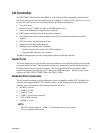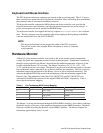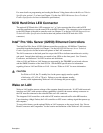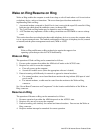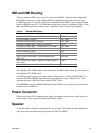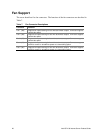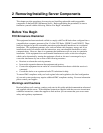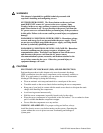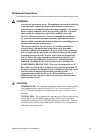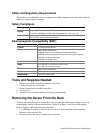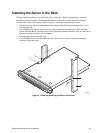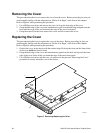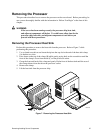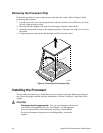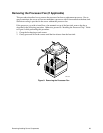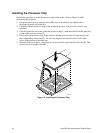
Removing/Installing Server Components 23
Rackmount Precautions
Familiarize yourself with the following precautions before rackmounting the server.
WARNINGS
ANCHOR THE EQUIPMENT RACK: The equipment rack must be anchored
to an unmovable support to prevent it from falling over when one or
more devices are extended in front of it on slide assemblies. The anchors
must be able to withstand a force of up to 113 kg (250 lbs.). You must
also consider the weight of any other device installed in the rack.
M
AIN AC POWER DISCONNECT: You are responsible for installing an
AC power disconnect for the entire rack unit. This main disconnect
must be readily accessible, and it must be labeled as controlling power to
the entire unit, not just to the server(s).
G
ROUNDING THE RACK INSTALLATION: To avoid the potential for
electrical shock, you must include a third wire safety grounding
conductor with the rack installation. If server power cords are plugged
into AC outlets that are part of the rack, then you must provide proper
grounding for the rack itself. If server power cords are plugged into
wall AC outlets, the safety grounding conductor in each power cord
provides proper grounding only for the server. You must provide
additional, grounding for the rack and other devices installed in it.
OVERCURRENT PROTECTION: The server is designed for an AC
line voltage source with up to 20 amperes of overcurrent protection. If
the power system for the equipment rack is installed on a branch circuit
with more than 20 amperes of protection, you must provide
supplemental protection for the server. If more than one server is
installed in the rack, the power source for each server must be from a
separate branch circuit.
CAUTIONS
TEMPERATURE: The operating temperature of the server, when installed
in an equipment rack, must not go below 5 °C (41°F) or rise above 35 °C
(95 °F). Extreme fluctuations in temperature can cause a variety of server
problems.
VENTILATION: The equipment rack must provide sufficient airflow to the
front of the server to maintain proper cooling. There must be sufficient
ventilation to exhaust at least 1,500 BTU per hour for each server. The rack
selected and the ventilation provided must be suitable to the environment in
which the server will be used.



